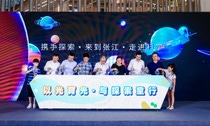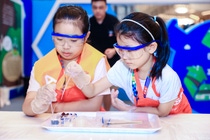Media
BASF Kids' Lab cooperates with Zhangjiang Science Hall to cultivate young scientists for a sustainable future
- Presenting a cross-disciplinary science education journey for more than 240 kids in Shanghai
- Hands-on experiments with “Magic Ink” enable kids to enjoy the chemical innovation and understand the importance of sustainability, drop-by-drop
Shanghai, China – Today, BASF and Zhangjiang Science Hall jointly launched the BASF Kids' Lab program in Shanghai, bringing more than 240 kids on a cross-disciplinary science education journey. In addition to conducting interesting chemistry experiments, children can explore the mysteries of architecture, which helps them to cultivate a scientific, innovation-focused mindset.
BASF has always been committed to promoting science education for children in China. For the event, BASF presented an upgraded version of “Magic Ink”. As the production and printing of ink is a complicated process, BASF R&D and technical teams have transformed the process into an easy and safe interactive experiment, guiding children to focus on key issues such as sustainable development and environmental protection.
"From new experiments to new venues and new experiences – we are delighted to incorporate new elements into the popular BASF Kids' Lab program with the support from Zhangjiang Science Hall. Through the engaging experiments, BASF provides children with hands-on opportunities to explore the mysteries of chemistry and cultivates young talents for a sustainable future,” said Dr. Han Wei, Vice President, Innovation Campus Shanghai, BASF.
Han Guobiao, Deputy Secretary of the Party Committee and Deputy General Manager of Shanghai Zhangjiang (Group) Co., Ltd., expressed her enthusiasm towards BASF’s participation in this year's Science Popularization Season at Zhangjiang Science Hall with Kids’ Lab program. This marks the second collaboration between the two parties. “Zhangjiang Science Hall serves as the key hub for science and technology activities in Zhangjiang Science City. As such, we are dedicated to developing it into an inclusive and open platform that facilitates science and technology worldwide exchanges. Zhangjiang Science Hall remains committed to introducing various social resources and working with high-tech enterprises to provide high-quality science education experiences to our audiences, including children.”
Since 2002, BASF Kids' Lab was introduced to China to promote science education among children. By the end of last year, more than 200,000 children participated into the program. In addition, BASF also recruited and trained thousands of volunteer teachers, many of whom participated in Kids' Lab programs during their childhoods. This year, more than 50 university students from well-known universities – such as Peking University, Zhejiang University, Beijing University of Chemical Technology, Ningbo University, and Southwest University – will become volunteer teachers to guide children in the experiments.
In Shanghai, the 2023 BASF Kids’ Lab arrangements are as below.
Magic Ink (45-minute workshop, eligible for children aged 6-12 years old)
Printing, one of the remarkable inventions of the Chinese people, has enabled the dissemination and exchange of knowledge and now is inseparable from our daily lives. This year, Dr. Bubbles will guide children in the essential wetting and adhesion stages of the printing process, use handmade ink to print patterns on the plastic folders and experience the magic of printing together.
About BASF in Greater China
BASF has been a committed partner to Greater China since 1885. With large production sites in Shanghai, Nanjing, Chongqing, and Zhanjiang, as well as a regional research and development hub in Shanghai, BASF is a major foreign investor in the country's chemical industry. BASF posted sales of approximately €11.6 billion in 2022 to customers in Greater China and employed 11,411 people as of the end of the year. For further information, please visit www.basf.com/cn.
About Zhangjiang Science Hall
Zhangjiang Science Hall is the first landmark completed and put into service in Zhangjiang‘s urban sub-center, with a total construction area of 115,000 square meters. It consists of 3 large exhibition halls, 20 conference rooms, and 7 activity and display spaces. It enables users to expand and discover more functions, allowing participants to experience and immerse themselves in the scene. With functions including international summits, industry roadshows, scientific innovation exchanges, cultural and artistic activities, and exhibitions, Zhangjiang Science Hall has become an open and inclusive scientific innovation exchange platform for global scientific and technological innovation sectors. For further information about Zhangjiang Science Hall, please visit https://www.zjsciencehall.com/.


